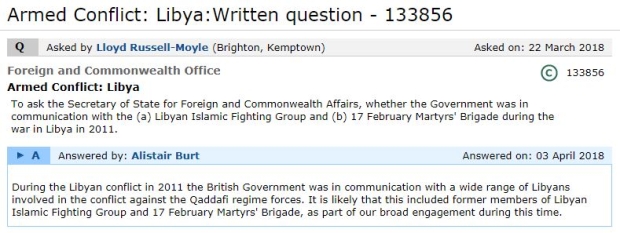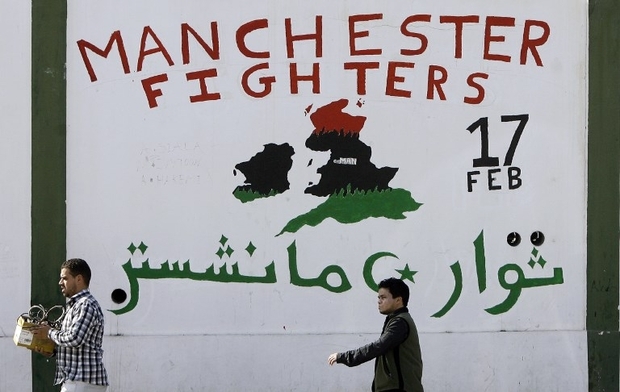This piece is over a year old. Not exactly surprising that it hasn't become public knowledge but, erm, wow. Has this popped up on the forum before? Please delete/move as appropriate if it has.
https://www.middleeasteye.net/news/revealed-uk-admits-contact-libyan-group-linked-manchester-bomber
https://www.middleeasteye.net/news/revealed-uk-admits-contact-libyan-group-linked-manchester-bomber
LONDON - The UK government has admitted it is "likely" it was in communications with former members of an al-Qaeda-linked Libyan militant group linked to the Manchester bomber Salman Abedi and his family during the country's 2011 uprising against Muammar Gaddafi.
Following last May's Manchester Arena attack, which killed 22 children and adults, it emerged that Abedi, 22, the British-born son of exiled Libyan dissident, returned to the north African country in 2011 with his father to fight with factions linked to the former Libyan Islamic Fighting Group (LIFG), alongside other anti-Gaddafi forces.
MEE revealed that British security services operated an “open door” policy that allowed Libyan exiles and British-Libyan citizens to join the 2011 uprising even though some had previously been subject to counter-terrorism control orders.
The rebels were also backed by NATO, with the UK, France and the US conducting air strikes targeting Gaddafi forces. Gaddafi himself was killed by militants following an air strike on a convoy in which he was travelling in October 2011.
But, for the first time, the government has admitted it was "likely" in contact with "former members of the Libyan Islamic Fighting Group", an organisation which was banned in the UK because of its links to al-Qaeda.
The LIFG was founded in 1995 by anti-Gaddafi Libyan fighters who had fought against the Soviet Union's occupation of Afghanistan in the 1980s, and the group had close contacts with the leaders of al-Qaeda, which also emerged out of the same fight.
The LIFG subsequently attempted to distance itself from al-Qaeda and condemned the targeting of civilians.
“During the Libyan conflict in 2011 the British Government was in communication with a wide range of Libyans involved in the conflict against the Gaddafi regime forces. It is likely that this included former members of Libyan Islamic Fighting Group and 17 February Martyrs Brigade, as part of our broad engagement during this time,” said Foreign Office minister for the Middle East Alistair Burt, in a written response to a parliamentary question, which was published just after MPs rose for their Parliamentary break at Easter.

The LIFG was reported to have disbanded in 2010 but its key leaders were still active in 2011 and many of its former members joined the 17 February Martyrs Brigade, one of the main anti-Gaddafi fighting forces as the revolution gathered pace in 2011.
Many volunteers from Manchester also fought for the 17 February Martyrs Brigade, including Ramadan Abedi, Salman Abedi's father, who was reportedly a former member of the LIFG.
Lloyd Russell-Moyle MP, who asked the question, said: "The Foreign Office has told me that it is 'likely' it had links to the Libyan rebel group for which the Manchester bomber fought."
He said the response left the government with "serious questions" to answer over whether it facilitated Abedi's travel to fight in Libya.
After his father returned to Libya in 2011 to fight for LIFG, Abedi reportedly travelled back and forth between his home and Manchester and Tripoli, and fought alongside his father during the school holidays.
Other reports indicate he was injured in 2014 in eastern Libya while fighting for an Islamist militant faction.
Fabian Hamilton MP, a member of Labour's shadow foreign office team, told MEE: “These revelations show that the British government must look more closely at who it supports and has communications with, not only in Libya, but across the world.
"The situation in Libya in 2011 was extremely complex, and still is today, with several different organisations claiming to represent the people of that country, while showing a willingness to take part in violence to meet their political ends.”
Following the Manchester attacks, several former Libyan rebel fighters now back in the UK told MEE that they had been able to travel to Libya with "no questions asked" and that "old-school LIFG guys" were allowed to travel to the country.
At the time, sources told MEE it appeared the government allowed the travel of Libyan exiles keen to fight against Gaddafi, including some whom it had earlier deemed to pose a potential security risk.
Raffaello Pantucci, director of international security studies at the Royal United Services Institute (RUSI), told MEE the revelations showed the “complexity” of the Libyan conflict. “If you are dealing with a situation when armed groups are the dominant forces, you are obliged to deal with them, but in a fluid situation, as was the case in Libya, you can find that someone who was an ally one day can produce conflict the next," he said.
Moazzam Begg, a former Guantanamo Bay prisoner and outreach director of human rights group Cage, who visited Libya in 2011, told MEE that the British government's use of and support for former members of the LIFG during the Libyan uprising was a "pretty open secret".
"There is no doubt that the very same people imprisoned and placed under control orders in the UK - based largely on secret evidence provided by Gaddafi regime - later left the UK to become leaders in the war against him," said Begg.
Begg pointed to the example one former LIFG exile in Birmingham who was placed on a control order in the UK but was subsequently appointed head of security for visiting foreign dignitaries by Libya's transitional government.
The official coordinated visits by British prime minister David Cameron, French president Nicolas Sarkozy, US secretary of state Hilary Clinton, and then-Turkish prime minister Recep Tayyip Erdogan, Begg told MEE.
'Seeking a hardline Islamic state'
The UK government listed the LIFG as a terrorist organisation in 2005, describing it as seeking to establish a "hardline Islamic state" and "part of the wider Islamist extremist movement inspired by al-Qaeda".
The US State Department has said elements of the LIFG had pledged loyalty to Osama bin Laden and al-Qaeda and designated the group a foreign terrorist organisation in 2004.
Former members of the LIFG deny that the group had any links with al-Qaeda and say it was committed only to removing Gaddafi from power.
In 2011, then-British prime minister David Cameron told parliament: "The Libyan Islamic Fighting Group was allied with al-Qaeda. It is not any more and has separated itself from that organisation."

A mural in Tripoli paying tribute to fighters from Manchester who joined the 17 February Martyrs' Brigade during Libya's revolution against Gaddafi (AFP)
The LIFG became a significant anti-Gaddafi force in Libya in the late 90s, until a government clampdown forced many members to flee - and many were granted refugee status in the UK.
But LIFG exiles found themselves under scrutiny in the UK following a rapprochement between the British and Libyan governments in 2004, which resulted in greater cooperation between the countries' security services.
According to documents retrieved from the ransacked offices of the Libyan intelligence agency following Gaddafi's fall from power in 2011, British security services cracked down on Libyan dissidents in the UK as part of a deal with Gaddafi, as well as assisting in the rendition of two senior LIFG leaders, Abdel Hakim Belhaj and Sami al-Saadi, to Tripoli where they allege they were tortured.
Belhaj later returned to Libya and was a leading figure in the uprising against Gaddafi, while another former Libyan exile subjected to a control order in the UK was later tasked with providing security for visiting dignitaries including Cameron, French president Nicolas Sarkozy and US secretary of state Hillary Clinton, MEE understands.
The Islamic State (IS) group, which was able to seize territory in Libya around the central city of Sirte as rival Libyan governments and militias emerged following the fall of Gaddafi, claimed responsibility for the Manchester bombing.
Salman Abedi is reported to have also had contact with jailed IS recruiter Abdalraouf Abdallah, another British-Libyan from Manchester who suffered paralysing injuries while fighting with the 17 February Martyrs Brigade in Libya.
Abdallah was convicted in 2016 of assisting others in committing acts of terrorism after facilitating and arranging for British men, including his brother, to travel to Syria to fight for IS.
A security source told MEE that officials were unable to comment on Abedi and his family members' travel in Libya, because of the active extradition request for Hashem Abedi, the brother of Salman Abedi.
Hashem Abedi, 20, was arrested in Libya shortly after his older brother blew himself up at the Manchester Arena, and UK authorities want him to return to the UK to face mass murder charges.
The Foreign Office declined to comment.
